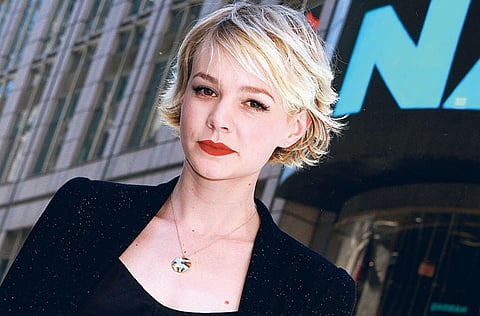Losing it
Hairfall is a common problem. Here are the experts' solutions

Her hairstyle was the hit of the summer, with women the world over copying her adorable crop. But last week it emerged that British actress Carey Mulligan is suffering from something that affects multitudes of women in the UAE: hair loss.
The Never Let Me Go actress, 25, revealed she has been forced to take protein supplements because her locks have been left sparse and damaged by constant colouring and styling for films.
Even without a Hollywood actress' high-maintenance styling needs, the issue of hair thinning is something many women in the Emirates can sympathise with, according to leading hair stylists in the city, who say they see many of their clients complaining of thinning and hair loss. In the UAE, it's usually put down to the desalinated water we wash in, but celebrated British trichiologist Phillip Kingsley, a hair doctor who has treated women from the UAE at his London clinic, says the most likely cause is health and diet.
"We are seeing more and more women with thinning hair due to nutritional factors than ever before. It may be that there have been so many ‘'fad'' diets for weight reduction, detoxing etc. And 2011 has started the ball rolling again, so I have little doubt that we will be seeing more women with hair thinning problems."
"There is no scientific evidence, nor reason, why desalinated water should affect hair growth. I have seen a considerable number of women from Dubai with hair loss problems. In the vast majority of women we have seen from Dubai at my clinic, there have been nutritional problems, hormonal anomalies, questionable thyroid measurements, or iron levels."
Kingsley is famous for his attention to the scalp -- according to him, the health of the scalp can determine the health of the hair. "Make sure that you are not abusing your hair by pulling too tight when blow drying, or breaking it off. Be sure that you have a healthy scalp - studies have shown that flaky/itchy scalps cause more hair fall. Wash your hair daily with an appropriate shampoo and use a scalp mask and scalp tonic frequently for 6-8 weeks." He also recommends an increase of dietary protein and iron -- although results can take time to appear as hair only grows 1cm a month.
Claude Hachache, style director at Toni and Guy salons in Dubai, agrees that there are usually several factors at play in the hair loss she sees in her young female clients, although she maintains that the local water can be damaging.
"When women say they are losing their hair, it's usually a combination of many reasons," Hachache says. "It's caused because the water is full of chlorine, air-conditioning doesn't have enough oxygen, or from taking medication such as the Pill or diabetes treatments or a change in diet. The health of your hair comes from the inside out, so the first treatment is to take iron supplements and eat more fish — three times a week — to get the omega 3s. You can also take supplements if you don't like fish."
When Hachache says hair is treated from the inside out, she doesn't just mean what you eat, though — what's inside your head is just as important. "Stress contributes to hair loss, and sometimes you end up losing hair because you're focusing on it so much." Hachache reminds women that it's normal to lose 50-100 hairs a day.
So calm down, says the stylist. You might see 300 hairs falling in one shower because that has been the loss over a few days. She recommends brushing your hair daily to avoid that stress and also because it's a great way to stimulate your scalp. "I do this with a flat, wide-tooth plastic comb in the shower when I apply conditioner."
Elaine Quinn, salon manager at Ted Morgan Hair Group, adds sunshine to the list of culprits. "Always cover your hair, get regular haircuts, every six weeks, and try not to use the straighteners," is her advice. "Many women think their hair is falling out when it's just breaking off because it's overprocessed."
Top styles for thin hair
The right haircut can help hair look fuller while you're treating it, says Elaine Quinn. "Always go for something more solid, as opposed to a textured cut," she advises. When it comes to colour, stay away from very blonde shades. "You'll be exposing your scalp."
Short hair: "A pixie crop can look good because there's no parting and there's more hair in one space. You make it look thicker with the help of a little styling product."
Long hair: "Keep it blunt to get maximum fullness."
British trichologist Phillip Kingsley has treated many people from the region for hair loss. His top tip is to take care of your scalp and rethink your nutrition.
“Hair is protein, which makes protein intake so important. All foods are broken down in the digestive process into glycogen, which help in the production of cells throughout the body, including hair.
Iron, too, will help in the production of hair cells, so it is important to eat iron containing foods such as beef and liver. It is sometimes necessary to take supplemental iron if the iron levels are on the low side.
Thyroid measurements, too, may need to be tested, because high and low thyroid problems affect hair cells.”
A good, healthy balanced diet should include:
- Proteins are most important.
- First class proteins for hair are meat, fish, poultry, eggs.
- Proteins are most important at breakfast and lunch.
- Eat at least two pieces of fruit daily.
- A salad daily.
- A litre of water.
- A good supplement with minerals and vitamins.
- Not too much dairy produce: Avoid too much cheese, butter, cream.
- Avoid highly spiced food, hot curries for example.



